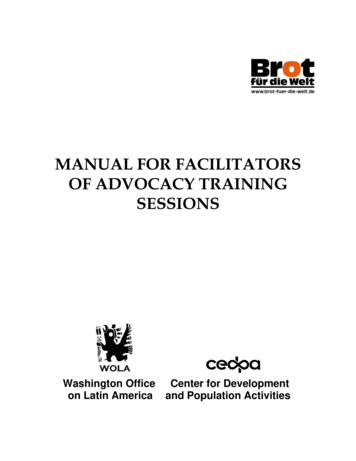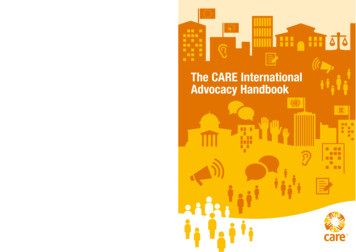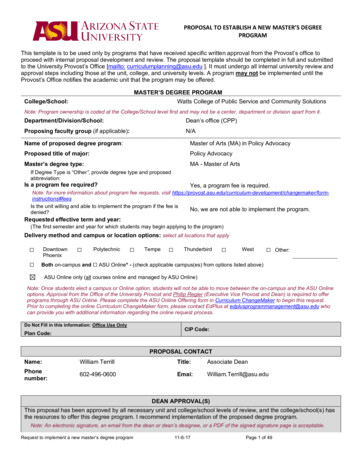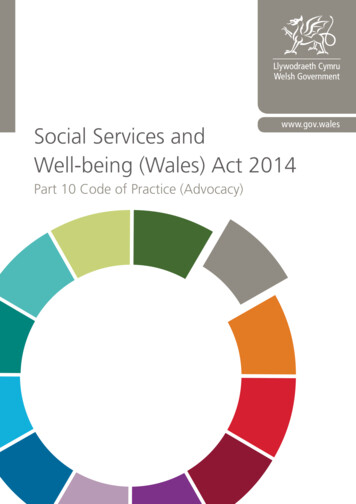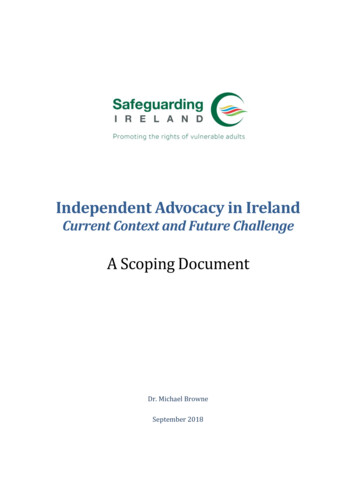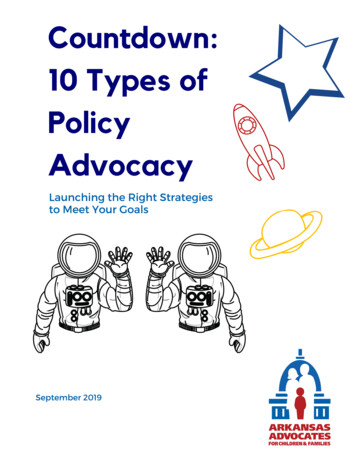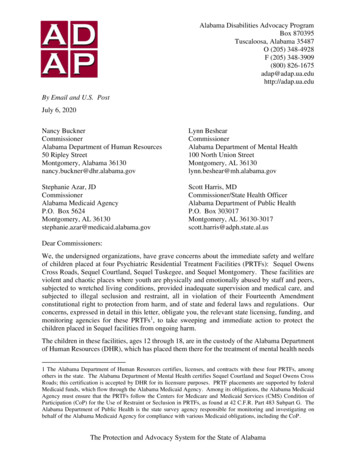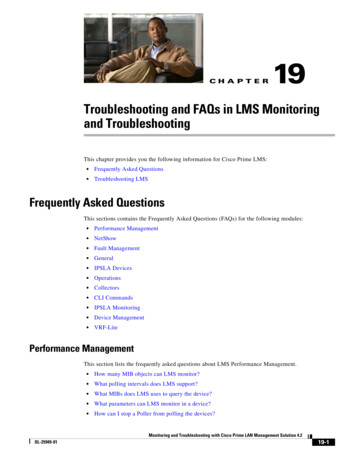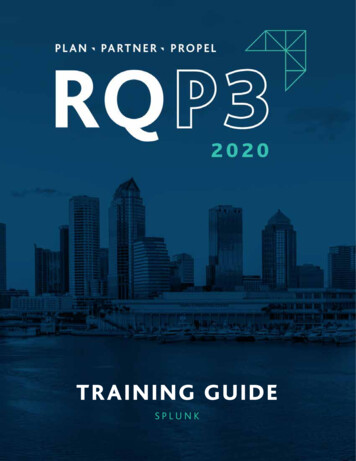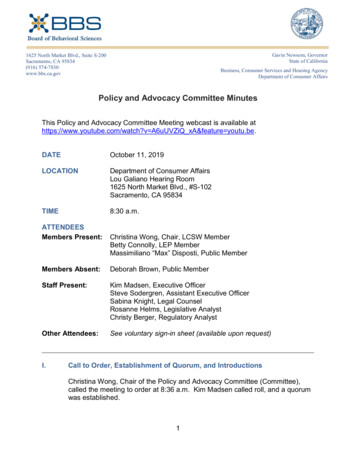
Transcription
Gavin Newsom, GovernorState of California1625 North Market Blvd., Suite S-200Sacramento, CA 95834(916) 574-7830www.bbs.ca.govBusiness, Consumer Services and Housing AgencyDepartment of Consumer AffairsPolicy and Advocacy Committee MinutesThis Policy and Advocacy Committee Meeting webcast is available athttps://www.youtube.com/watch?v A6uUVZiQ xA&feature youtu.be.DATEOctober 11, 2019LOCATIONDepartment of Consumer AffairsLou Galiano Hearing Room1625 North Market Blvd., #S-102Sacramento, CA 95834TIME8:30 a.m.ATTENDEESMembers Present:Christina Wong, Chair, LCSW MemberBetty Connolly, LEP MemberMassimiliano “Max” Disposti, Public MemberMembers Absent:Deborah Brown, Public MemberStaff Present:Kim Madsen, Executive OfficerSteve Sodergren, Assistant Executive OfficerSabina Knight, Legal CounselRosanne Helms, Legislative AnalystChristy Berger, Regulatory AnalystOther Attendees:See voluntary sign-in sheet (available upon request)I.Call to Order, Establishment of Quorum, and IntroductionsChristina Wong, Chair of the Policy and Advocacy Committee (Committee),called the meeting to order at 8:36 a.m. Kim Madsen called roll, and a quorumwas established.1
II.Approval of August 2, 2019 Committee Meeting MinutesThis item was tabled.III.Discussion and Possible Recommendation Regarding ProposedTechnical Amendments to Business and Professions Code Sections4980.01, 4980.43.2, 4980.43.3, 4983, 4987.5, 4989.66, 4990.30, 4996.12,4996.14, 4996.22, 4996.23.1, 4998, 4999.22, 4999.46.1, 4999.46.2, 4999.86,4999.123Staff recommends several technical changes in the Business and ProfessionsCode (BPC) as proposed legislation for 2020.1. Amend BPC §§ 4987.5, 4998, and §4999.123 – ProfessionalCorporationsBackground: These sections specify that licensed marriage and familytherapist (LMFT), licensed clinical social worker (LCSW), and licensedprofessional clinical counselor (LPCC) corporations are authorized to renderprofessional services as long as the corporation and its shareholders,officers, directors, and employees rendering professional services, who arespecified license holders, are in compliance with the Moscone-KnoxProfessional Corporation act and other relevant statutes and regulations.The sections list which license types may be officers, directors, oremployees rendering professional services. However, this list is outlined inCorporations Code §13401.5. Occasionally, the legislature changes the listin the Corporations Code, but the BPC does not get updated.Recommendation: Staff recommends striking the list of professions in BPC§§ 4987.5, 4998, and 4999.123, as they are already listed in theCorporations Code and to avoid incorrect language.2. Amend BPC §4980.43.3 - RenumberingBackground: BPC §4980.43.3 contains a numbering error in subdivision (c).The two criteria listed as (1) and (2) should be labeled as subdivisions (A)and (B).Recommendation: Renumber the contents of subdivision (c).3. Amend BPC §§ 4980.43.2, 4996.23.1, 4999.46.2 – Definition of “OneHour of Direct Supervisor Contact”2
Background: These sections define “one hour of direct supervisor contact”as a specified amount of face-to-face contact between a supervisor andtheir supervisees.The intended definition of “face-to-face” contact is to require that thesupervisor and supervisee(s) meet in person for the supervision session.This is implied in subdivisions 4980.43.2(d), 4996.23.1(f), and 4999.46.2(d),which state that notwithstanding the definitions of “one hour of directsupervisor contact”, an associate working in an exempt setting may obtaintheir required weekly direct supervisor contact via videoconferencing.However, due to questions concerning “face-to-face”, staff believes it wouldbe helpful to clarify that “face-to-face” contact means that the contact mustbe in-person.Recommendation: Amend the definition of “one hour of direct supervisorcontact” in §§ 4980.43.2, 4996.23.1, and 4999.46.2 requiring in-person faceto-face contact.4. Amend BPC §§ 4980.01, 4996.14, 4999.22 – Notice to Clients AboutFiling a ComplaintBackground: Last year via AB 630, the Board amended the law to requirethat unlicensed or unregistered therapists in exempt settings provide theirclients with information about where to file a complaint about the therapist.In its review of the bill, the Senate Committee on Business, Professions, andEconomic Development suggested that the following language also beincluded in the notice provided to clients of unlicensed or unregisteredtherapists:The Board of Behavioral Sciences receives and responds tocomplaints regarding services provided by licensed or registeredpsychotherapists. If you have a complaint and are unsure if yourtherapist is licensed or registered, please contact the Board ofBehavioral Sciences at 916-574-7830 for assistance.Adding this language would provide a consumer who is unsure about theirtherapist’s license status with an additional resource to verify a license orregistration.Recommendation: Amend the above statement into the notice required by§§ 4980.01, 4996.14, and 4999.22.Ms. Wong: Proposal uses two terms: psychotherapist and therapist.Recommends using term “therapist” instead of psychotherapist.3
Staff recommended using the term “counselor” in place of “psychotherapist”and “therapist.”Mr. Disposti: Recommended providing the Board’s website as a resource inaddition to the Board’s phone number.Committee and staff agreed to the recommended changes discussed.5. Amend BPC §4990.30 - Petitions for Reinstatement or Modification ofPenaltyBackground: In order to clear up some ambiguities in BPC §4990.30, theBoard’s legal counsel recommended clarifying certain provisions regardingthe procedure for petitioning to terminate probation early or modify apenalty: Subdivision (b) currently specifies timeframes after which a petition canbe filed with the Board. Until recently, the Board has operated under theassumption that time during which a probation is tolled also countstoward the specified timeframes. However, in a recent case, anadministrative law judge challenged this assumption, stating it isincorrect. Staff wishes to clarify that the timeframes exclude any periodsof probation tolling. Subdivision (c) states that that a petition may be heard either by theBoard or that the Board can assign the petition to an administrative lawjudge. However, subdivision (d) implies that the petitioner has some sayin who hears the case, stating “The petitioner may request that the boardschedule the hearing on the petition for a board meeting at a specific citywhere the board regularly meets.” While the intent of this is likely toprovide that the petitioner may request their case to be heard, it mayalso inadvertently imply that a petitioner can request the Board to hear acase instead of an administrative law judge.Recommendation: Amend subdivision (b) to exclude periods of probationtolling from the required timeframes before a petition can be filed. Amendsubdivision (d) to clarify that a petitioner can only request a hearing locationif the Board is hearing the case.6. Amend BPC §4996.22 – Acceptable LCSW Continuing EducationProvidersBackground: Current law states that social workers can only obtaincontinuing education (CE) from an accredited school if the school isaccredited by the Commission on Accreditation of the Council of SocialWork Education. It does not permit social workers to gain CE from a school4
accredited by the U.S. Department of Education (USDE) or approved by theBureau for Private Postsecondary Education (BPPE).Staff believes this is unintentional and that social workers should be able togain CE from a school accredited by USDE or approved by BPPE.Recommendation: Amend BPC §4996.22 to permit clinical social workersto obtain CE from a school accredited by USDE or approved by BPPE.7. Amend BPC §4999.46.1 – Delete Duplicative Definition of SupervisionBackground: BPC §§ 4999.12 and 4999.46.1 define “supervision” in theLPCC statute. BPC §4999.12 defines terms used throughout the LPCClicensing statute. It should not be duplicated in §4999.46.1.Recommendation: Delete the duplicative definition of “supervision” in BPC§4999.46.1.8. Amend BPC §§ 4983, 4989.66, 4996.12, and 4999.86 – Fines forLicensing Act ViolationsBackground: LMFT and LPCC laws have provisions establishing amisdemeanor charge and a fine of 2,500 and/or six months in county jailfor violating the respective licensing acts.The LCSW law has this clause as well; however, the fine amount is 1,000.The Licensed Educational Psychologist (LEP) law states a violation of itschapter is a misdemeanor but does not specify a punishment of jail time or afine.Staff believes the stated punishment for a violation of the Board’s licensingacts should be consistent but has been unable to determine the reason forthe inconsistency. Both the LMFT section establishing the 2,500 fine, andthe LCSW section establishing the 1,000 fine were established in the mid1980’s and have not been amended since. Legislative history explaining thereason for differing fines is not available. The LPCC and LMFT licensinglaws are consistent because LPCC law was modeled after the LMFT law.These fines are court fines. BPC §125.9 grants boards the authority toestablish a system for issuance of citations and administrative fines viaregulations. The Board has done this in regulation §1886.40, whichestablishes fines of up to 2,500 for citable offenses or up to 5,000 if theoffense meets certain specified circumstances.5
Recommendation: Amend LCSW and LEP law to specify the misdemeanorpunishment for a licensing act violation is a 2,500 fine and/or six months injail, making it consistent with current LMFT and LPCC law.Since there is a lack of historical information, staff recommended removingthe dollar amount of the fine from the language and replace it with “asdetermined by the court.”MOTION: Move to direct staff to make any discussed changes, and any nonsubstantive changes, and bring to the Board for consideration as a legislativeproposal. Wong moved; Connolly seconded. Vote: 3 yea, 0 nay. Motioncarried.Roll call vote:MemberDeborah BrownBetty ConnollyMax DispostiChristina WongIV.YeaNayxxxAbstainAbsentxRecusalDiscussion and Possible Recommendation Regarding ProposedLegislative Amendments Needed Due to the Passage of AB 2138:Business and Professions Code Sections 4980.40, 4982, 4989.20, 4989.24,4989.54, 4992.3, 4996.2, 4996.18, 4999.42, 4999.51, 4999.80, 4999.90AB 2138 was signed into law and becomes effective on July 1, 2020. This billmakes amendments to the Department of Consumer Affairs (DCA) boards’enforcement processes, including placing new limits on when a board can denya license based on a conviction or prior formal disciplinary action.AB 2396 prohibited DCA boards from denying a license solely based on theapplicant having certain types of convictions that have been expunged.The passage of both bills require clean-up amendments in the Board’s fourpractice acts so that related language is consistent throughout the statutes.These amendments fall into the following four categories.1. Amend BPC §§ 4980.40, 4989.20, 4996.2, 4999.42, and 4999.51 –Qualifications for Licensure or RegistrationBackground: These sections list criteria needed to qualify for a license orregistration. One criteria states that the person must not have committedany acts or crimes constituting grounds for denial of licensure under BPC6
§480. (BPC §480 outlines reasons a board may deny a license, and it wassignificantly changed by AB 2138.)BPC §480 used to allow denial of licensure based on convictions or certainacts involving fraud, dishonesty, or deceit. However, that language hasbeen changed, and now denial is permitted based on certain types ofconvictions or based on formal discipline due to professional misconductthat occurred within a specific time frame and is substantially related to theprofession.Recommendation: Given the recent changes to BPC §480, staffrecommends striking the old language that the applicant must not havecommitted acts or crimes constituting grounds for denial under §480.Instead, staff recommends an amendment that simply states that the personmust not be subject to denial of licensure pursuant to §480.2. Amend BPC §§ 4980.40, 4989.24, 4996.2, 4999.42, and 4999.51 –Reference to Penal Code Section 290Background: Penal Code (PC) §290 specifies various types of crimes forwhich registration as a sex offender is required.PC §290 is being reorganized effective January 1, 2021. Under the newversion of that law, the types of sex offenses have been organized into threetiers, depending on the severity of the crime. The higher the tier, the longerthe required registration as a sex offender.AB 2138 amended BPC §480 to specify that only the two higher tier sexoffenses in the new PC §290 are subject to license denial regardless of theseven-year age limitation. However, there are several sections in theBoard’s practice acts that specify denial for any required registration underPC §290. These are now overridden by the changes made in AB 2138.Recommendation: Amend the listed sections of the BPC to specify that anydenials due to PC §290 registration must also be in accordance with theconditions for denial specified in §480.3. Amend BPC §§ 4982, 4989.54, 4992.3, and 4999.90– UnprofessionalConduct Provisions.Background: These sections contain a definition of a conviction. However,AB 2138 amended the definition of a conviction in BPC §7.5 for thepurposes of denying a license pursuant to §480. Therefore, staffrecommends referencing that definition here.7
These sections also contain language permitting suspension, revocation, ordenial of a license regardless of whether a conviction has been dismissedpursuant to PC §1203.4. However, due to amendments made in AB 2396and AB 2138, denial of licensure is not permitted on the basis of this type ofdismissed conviction. Instead of including this specific language, staffrecommends an amendment stating actions to suspend, revoke, or deny alicense must be in compliance with Division 1.5 of the BPC (this Divisioncontains §480 and contains the statutes governing denial, suspension, andrevocation of licenses.)Recommendation: Amend the unprofessional conduct sections to referencethe definition of a conviction referenced in BPC §7.5. Amend the sections tostate that suspensions, revocations, or denials of a license or registrationmust be in accordance with Division 1.5 of the BPC.4. Amend BPC §4999.80 – References to Statutes Governing LicenseDenials, Suspensions, or RevocationsBackground: BPC §4999.80 references laws governing license denials,suspensions, or revocations. BPC §490 governs license suspensions andrevocations and is not included in the list of referenced sections.Recommendation: Amend BPC §4999.80 to include BPC §490 in the list ofreferenced sections that pertain to license denials, suspensions, orrevocations.MOTION: Direct staff to bring to the Board for consideration as a legislativeproposal. Wong moved; Disposti seconded. The motion carried; 3 yea, 0 nay.Roll call vote:MemberDeborah BrownBetty ConnollyMax DispostiChristina WongV.YeaNayxxxAbstainAbsentxRecusalDiscussion and Possible Recommendation Regarding Custody of ClientRecords Due to Licensee Death or IncapacitationThe Board receives inquiries about what should happen to client records if thetherapist dies or becomes incapacitated.The Board’s statutes and regulations do not address this. Some professionalassociations address this in their codes of ethics.8
American Psychological Association’s (APA’s) Ethical Principles ofPsychologists and Code of Conduct: APA Ethics Code Section 6.02(c): Psychologists make plans in advanceto facilitate the appropriate transfer and to protect the confidentiality ofrecords and data in the event of psychologists' withdrawal from positionsor practice. APA Ethics Code Section 3.12: Unless otherwise covered by contract,psychologists make reasonable efforts to plan for facilitating services inthe event that psychological services are interrupted by factors such asthe psychologist's illness, death, unavailability, relocation, or retirementor by the client's/patient's relocation or financial limitations.The American Counseling Association’s 2014 ACA Code of Ethics: ACA Code of Ethics Section B.6.i.: Reasonable Precautions:Counselors take reasonable precautions to protect client confidentialityin the event of the counselor’s termination of practice, incapacity, ordeath and appoint a records custodian when identified as appropriate.Some other states have taken steps to require that their licensed mental healthprofessionals take certain actions to ensure safekeeping of client records. Texas: Requires that its licensed professional counselors notify theirpatients of the following as part of their informed consent before providingservices:“the established plan for the custody and control of the client’s mentalhealth records in the event of the licensee’s death or incapacity, or thetermination of the licensee’s counseling practice.” (Texas AdministrativeCode Title 22, Chapter 681, §681.41(e)(8)) Florida: Requires that if client termination was due to the licensee’s death,records must be maintained for at least two years. After that, the executor,administrator, or survivor must publish a notice once a week for 4consecutive weeks in the highest circulated newspaper in each county ofpractice. The notice must state that the records will be disposed of ordestroyed 4 weeks or later from the notice publication. (FloridaAdministrative Code §64B4-9.001(4)) Oregon: Requires its licensed marriage and family therapists andprofessional counselors to arrange for the maintenance of and access torecords in the event of the death or incapacity of the licensee. Oregonlicensees must file the name of a custodian of record with the board, alongwith that person’s (or organization’s) contact information. The custodian of9
record must be an Oregon-licensed mental health professional, a licensedmedical professional, a health care or mental health organization, andattorney, a school, or a medical records company. (Oregon AdministrativeRules Chapter 833, §833-075-0080) Washington: Requires its licensed mental health counselors, marriage andfamily therapists, and social workers to make provisions for retaining ortransferring records in the event of going out of business, death, orincapacitation. The provisions may be made in the practitioner’s will, anoffice policy, or by ensuring another licensed counselor is available toreview records with a client, or other appropriate means. (WashingtonAdministrative Code §246-809-035(5))HIPAA and Client RecordsDoes establishing a plan to transfer client records to another practitioner upon atherapist’s death interact with the federal Health Insurance Portability andAccountability Act (HIPAA)?The U.S. Department of Health and Human Services (HHS) has an FAQ aboutHIPAA for professionals on its website. It states that health care providers canuse health information for treatment purposes without the patient’sauthorization, including to consult with other providers or to refer the patient.DiscussionMs. Connolly: Hesitant to develop regulation that the Board cannot enforce.The Board can make a recommendation to its licensees but cannot enforce thelaw on a deceased licensee or the executor unless he/she is a licensee.Ms. Wong: Perhaps the associations could address this in their code of ethicsand provide guidance.An informed consent between therapist and client was discussed.Ms. Wong: Requested more research regarding an informed consent.Mr. Sodergren: Does not want to perform audits on informed consent forms.Could this be a best practices suggestion instead of a regulation?Jaclyn, California Society for Clinical Social Work (CSCSW): An informedconsent would be appropriate but needs more discussion.Kristin Roscoe, California Association of Marriage and Family Therapists(CAMFT): CAMFT receives a lot of questions regarding this issue. CAMFT’sCode of Ethics includes a recommendation. Not supportive of anything thatplaces a burden on family members. In favor of an informed consent andproviding information to the public.10
Kenneth Edwards, California Association for Licensed Professional ClinicalCounselors (CALPCC): Suggested using language that would incorporateelectronic records, providing direction on how to provide access to records toan executor or clinician. Prefers to not codify this, but instead recommending aplan. Suggests that the association develop a template to recommend a planon how to pass on the records.Janlee Wong, National Association of Social Workers, California Division(NASW-CA): Agencies have rules regarding record retention as well astransferring records to other clinicians. Private practice is complicated. Agreesthat the Board may not have jurisdiction over a deceased therapist’s estate,which gets into probate and trust laws. Consent form – it is important to explainthe limits to confidentiality, which is outlined in the consent form, such as howto obtain records in the event the therapist dies. Client has access to content inthe records; however, some content belongs to the therapist. Intends to takethis matter back to the association for discussion.Bita Rivas, CALPCC: There should be discussions regarding what informedconsent should look like and what information should clients have access to.HIPAA includes policies and practices in maintaining client records.Ms. Wong: Suggested that staff research and collect more feedback from theassociations.VI.Discussion and Possible Recommendation Regarding ExaminationWaiting Periods, Professional Corporations, Accrediting Agencies andEquivalent Degrees: Title 16, California Code of Regulations: AmendSections 1805.05, 1850.6, 1850.7 and 1854; Repeal Section 1832A regulation proposal to consider changes pertaining to examination waitingperiods, professional corporations and educational institutions would do all thefollowing:Examination Waiting Periods (§1805.05) Specify a 180-day waiting period for a retake of the LEP writtenexamination. The waiting period for this exam is currently unspecified, butthis time period proposed is consistent with current practice. Reduce the waiting period for a board-developed clinical examination to 120days for consistency with current practice. Specify that the examination waiting periods are a minimum of 90 days.This would allow for flexibility in case an event outside of the Board’s controlimpacted the ability to administer examinations.11
Professional Corporations (§§ 1850.6 and 1850.7) Add LPCCs to the sections pertaining to ownership and transfer of shares,as well as the section on naming a professional corporation, for consistencywith the LMFT and LCSW professions.Accrediting Agencies and Equivalent Degrees (§§ 1832 and 1854) Delete the section pertaining to equivalent accrediting agencies for MFTapplicants. This section is no longer necessary as it is covered in statute(BPC §§ 4980.36, 4980.37, 4980.78 and 4980.79). Specify the accrediting agencies that are acceptable for licensededucational psychologist applicant degree programs for consistency withthe LMFT, LCSW and LPCC professions, and update the name of theforeign credentials’ evaluation service.DiscussionMs. Roscoe, CAMFT: Requested additional language clarifying the minimumwaiting period and clarifying/defining an event outside of the Board’s control.Ms. Wong recommended tabling the discussion regarding examination waitingperiods (§1805.05).MOTION: Direct staff to research and gather more information regarding§1805.05, and to make any discussed changes, and any non-substantivechanges and recommend to the full Board as regulatory proposal. Wongmoved; Connolly seconded. The motion carried; 3 yea, 0 nay.Roll call vote:MemberDeborah BrownBetty ConnollyMax DispostiChristina WongVII.YeaNayxxxAbstainAbsentxRecusalUpdate on Board-Sponsored, Board-Supported, and Board-MonitoredLegislationBoard-Sponsored LegislationSB 679 Healing Arts: Therapists and Counselors: LicensingStatus: SB 679 was signed by the Governor and becomes effective on January1, 2020.AB 630 Board of Behavioral Sciences: Marriage and Family Therapists: ClinicalSocial Workers: Educational Psychologists: Professional Clinical Counselors:Required Notice12
Status: AB 630 was signed by the Governor.SB 786: Healing Arts (Omnibus Bill)Status: SB 786 was signed by the Governor.Board-Supported LegislationAB 1651: Licensed Educational Psychologists: Supervision of Associates andTraineesStatus: AB 1651 was signed by the Governor.SB 163: Health Care Coverage: Pervasive Developmental Disorder or AutismStatus: SB 163 is on the Governor’s desk awaiting a decision.SB 601: State Agencies: Licenses: Fee WaiverStatus: SB 601 is on the Governor’s desk awaiting a decision.Board-Monitored LegislationSB 10 Mental Health Services: Peer, Parent, Transition-Age, and FamilySupport Specialist CertificationStatus: SB 10 is on the Governor’s desk awaiting a decision.SB 425 Health Care Practitioners: Licensee’s File: Probationary Physician’sand Surgeon’s Certificate: Unprofessional ConductStatus: SB 425 is on the Governor’s desk awaiting a decision.VIII.Update on Board Rulemaking ProposalsSubstantial Relationship & Rehabilitation Criteria (AB 2138 Regulations)Status: The regulations were noticed to the public on August 8th. The publichearing was held on September 30th. Comments were received from astakeholder, which will be brought to the November 2019 Board meeting forconsideration.Enforcement ProcessStatus: On hold until passage of AB 2138 regulations.Examination Rescoring; Application Abandonment; APCC SubsequentRegistration FeeStatus: Submitted to Office of Administrative Law for final approval on July22nd. The submission was subsequently withdrawn after language changeswere identified that need to be brought to the Board for consideration at itsNovember 2019 meeting.13
SupervisionStatus: DCA Initial Review. Staff identified some changes that will be broughtto the Board for consideration at its November 2019 meeting.IX.Public Comment for Items Not on the AgendaMr. Wong, NASW-CA: Office of Statewide Health Planning and Development(OSHPD) Mental Health Services Act Workforce Education and Training (WET)Five-Year Plan for 2020-2025, Innovations for Further Consideration section.WET is recommending to:Explore applying a portion of time of supervised clinical field workperformed during the final year of graduate school in the public mentalhealth system toward licensure; andUse the Health Workforce Pilot Projects Program to test changes in scopeof practice of licensed clinicians.Ms. Roscoe, CAMFT: CAMFT will be working towards addressing some issuespertaining to AB 5 next year and is looking to have a potential exemption for itsmembership. If CAMFT pursues legislation, it hopes to have the support of theBoard.X.Suggestions for Future Agenda ItemsMs. Wong: Penal Code §290 and its three tiers categorizing types of sexualoffenses.XI.AdjournmentThe Committee adjourned at 10:37 a.m.14
any acts or crimes constituting grounds for denial of licensure under BPC . 7 §480. (BPC §480 outlines reasons a board may deny a license, and it was . BPC §480 used to allow denial of licensure based on convictions or certain acts involving fraud, dishonesty, or deceit. However, that language has

